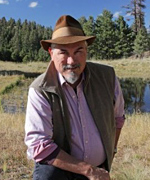 —Alan Dulaney
—Alan Dulaney
“Don’t do something—just stand there!” This call for inaction is often an appropriate dictum when faced with overly complex situations. Especially when passing law.
In the last month I have attended at least three meetings in which the last session of the Arizona Legislature was analyzed. Experienced lobbyists, powerful legislative leaders, and observant Capitol reporters all offered insights as to why absolutely nothing happened with respect to water legislation despite the expectations created by the Governor’s Water Discussions. Each had a different viewpoint into the process, but several commonalities emerged that are instructive.
Lesson #1: Don’t poke the bear. When the Governor’s Water Discussions convened in 2017, it was in the context of the feud that had erupted between ADWR and the Central Arizona Water Conservation District (CAWCD). Because the Governor’s staff was heading up the effort, it became clear that they intended to exercise considerable control over CAWCD and its claims to authority over Colorado River issues. And they were supported by many stakeholders at the table. Once they saw the direction being taken, CAWCD staff determined to protect what they saw as their prerogatives, and they quietly began a lobbying campaign with key legislators that eventually undercut the ADWR position. The Governor’s Water Discussions should have been a forum to diplomatically resolve the issues between CAWCD and ADWR, out of sight of all, but it wasn’t.
Lesson #2: Never leave key leaders alone in the dark. The two chairs of the House and Senate committees that hear water-related bills were never included in the Governor’s Water Discussions. CAWCD noted their absence, and convinced them that it was all a governance issue. It was no surprise, then, when they did not support the concepts that emerged, and instead came up with their own bills that did not address groundwater or Colorado River issues. Everyone commented on this lack of inclusion as a major failure. Now Representative Rusty Bowers and Senator Gail Griffin are traveling the state holding public meetings on water, a move that many legislators applaud for its outreach. Major stakeholders are missing it, but this inclusion effort is led by those who should have been included earlier, but were not.
Lesson #3: Don’t try to push complex subjects too quickly. No one in the Legislature is a water expert. When faced with complex issues with multiple implications that are often incomprehensible, most legislators would rather do nothing. And, in truth, this may be the right course at that moment. Legislators are often scared that they might be rushed into doing the wrong thing, which would haunt Arizona for decades to come. If you can’t understand what you are doing, prudence demands inaction. Water issues are not easily explained, and if cast in another light (such as governance, or rural vs. urban), comprehension may never dawn. In this session water issues were advancing early on and way too fast. Education is a slow process, but legislators are open to gaining understanding before they vote. One of the successes of the session was the number of bad bills killed.
Lesson #4: Once craziness descends, all bets are off. The Don Shooter expulsion roiled the Legislature, and normality vanished. Then masses of teachers in red shirts descended on the Capitol demanding immediate action, and a scramble to meet the urgency of the situation consumed everyone. Agendas were wrecked. Water was lost in the confusion. Sine die was a relief. Lobbyists, legislators, and reporters alike agreed that they had not ever seen a session this crazy.
So what does this mean for 2019? Inclusion and education must lead the list of goals for the Legislature, and all stakeholders must contribute time to the process. And that means the process cannot be pushed too fast, or be done in secrecy. Good water legislation takes time and preparation. Above all, the feud between CAWCD and ADWR must somehow be brought to an end.